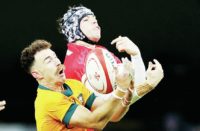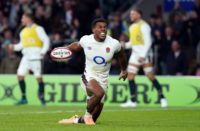 As the last line of defence, the full-back must be a good tackler with safe hands and a fair bit of pace to come into the line to create space and overlaps, and The Lions have been blessed with some of the game’s finest No.15s from the mercurial JPR Williams in 1971and ‘74, to the rock-solid Rob Kearney in 2009.
As the last line of defence, the full-back must be a good tackler with safe hands and a fair bit of pace to come into the line to create space and overlaps, and The Lions have been blessed with some of the game’s finest No.15s from the mercurial JPR Williams in 1971and ‘74, to the rock-solid Rob Kearney in 2009.
Nick Cain, chief writer for The Rugby Paper, says: “JPR Williams was one of the first full-backs to give the role a new dimension by becoming not just the last line of defence, but also the surprise package in attack.
“Along with being a fearless tackler and a skillful footballer, the outstanding element in JPR’s game was his superb timing, and it enabled him to make a major impact as The Lions Test No.15 throughout the landmark victories over New Zealand in 1971 and South Africa in 1974.
“Whether it was joining the defensive line to flatten an opposition runner, or as a sweeper who nullified the opposition’s up-and-unders, grubbers and chip-kicks, the former Welsh junior tennis star was a formidable obstacle – and he was similarly dangerous in attack. Although he did not have a winger’s sprinting speed, JPR was powerful and had a rare ability to time his runs so that he took the ball at full tilt, leaving tacklers with very little reaction time.
“Andy Irvine made his mark as an exceptional attacking full-back in the 1977 series against New Zealand, and again in South Africa in 1980, but The Lions, who went through a conservative, forward-orientated approach on those Tours, were unable to make the most of the flying Scot.
“On the 1989 Tour of Australia the No.15 Test berth was snapped-up by another Scot, the big adventurer Gavin Hastings, and he rose to the occasion with a crucial try in the Second Test, as The Lions turned the corner against the Wallabies. His five penalties in the decisive Third Test helped The Lions to a series win, and Hastings was appointed captain for the 1993 Tour of New Zealand.
Six Hastings penalties would have seen The Lions to victory in the First Test but for a controversial New Zealand penalty award at the death, but, after squaring the series, the All Blacks outplayed the 1993 Tourists in the final Test.
In South Africa in 1997 another ace goal-kicker swung the series The Lions’ way, with coach Ian McGeechan making the astute selection call of moving the Welsh fly-half, Neil Jenkins, to full-back. Jenkins not only kept the scoreboard ticking over in The Lions 26-15 First Test win over the Springboks in Cape Town, but his five penalties were the nails in their coffin before Jeremy Guscott‘s drop-goal sunk the home side a week later in Durban.
Matt Perry acquitted himself well in Australia 2001, but the disarray in New Zealand 2005 was evident in The Lions fielding a different full-back in each Test, with Jason Robinson, Josh Lewsey and Geordan Murphy doing the honours.
In 2009 Lee Byrne was the front-runner for the Test jersey against the Springboks, but when the Welshman was injured in the First Test, Rob Kearney got his chance. The Irish No.15 took it with both hands, and was not only immaculate under the high ball but counter- attacked with flair throughout the series, scoring a try to put The Lions in the driving seat in the Second Test cliff-hanger.
On that occasion it wasn’t to be, but Kearney will be among those pitching to take on the Wallabies in 2013.
Have your say on Twitter @therugbypaper
One Comment
Leave a Comment
You must be logged in to post a comment.























Ken Scotland would have left the Welshman for dead in skill and humility.